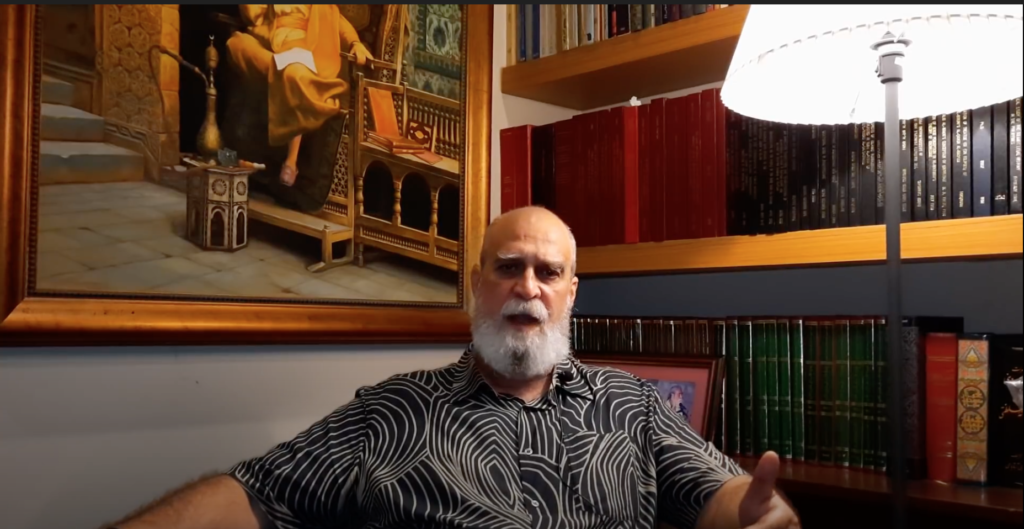শেষ জামানা বা আখিরুজ্জামান সম্পর্কে কুরআনে কি বলে? বিস্তারিত জানাচ্ছেন একজন কুরআনের স্কলার
ইক্বরার লক্ষ্য হলো বর্তমান ও ভবিষ্যত প্রজন্মের জন্য স্রষ্টার ঐশী বাণীর সমন্বিত অধ্যয়ন ও সার্বজনীন প্রয়োগের জন্য জ্ঞানদীপ্ত অনুশীলন।
ইক্বরার উদ্দেশ্য হলো কুরআনের বাণীর উত্তরোত্তর সমৃদ্ধ অনুধাবনের জন্য টেকসই ভিত্তি প্রস্তুত করা এবং জীবন ও সমাজের প্রায়োগিকতার জন্য প্রয়োজনীয় জ্ঞানভিত্তিক ফ্রেমওয়ার্ক বা কাঠামো নির্মাণ।
Dr. Syed Ali al-Attas is a giant among contemporary Muslim scholars of the world. Dr. Tawfik Al-Attas is the son of another great Muslim Scholar, Syed Muhammad Naquib al-Attas considered one of the 500 most influential Muslims. The Editor of theIQRA, Sadiq M Alam had the good fortune of meeting him in Singapore while studying at the National University of Singapore (NUS).
Dr. Attas identifies the root cause of the crisis in the Muslim world as Corruption of Knowledge, widespread ignorance has led to gross injustice and these injustices lead to confusion among Muslims. And this confusion gives rise to false leadership. This false leadership continues to add more confusion, adding to the problem, adding to more ignorance. This adds to more false leadership. The vicious cycle continues.
As an example, he gave a fantastic example of the corruption of knowledge and worldview using the Quran:
"We now, the Muslims today like to look on the Muslims in the past nostalgically as to how powerful we were, how much wealth we had, how big our Empire was, and things like this, how many scholars we had in the past; but we don't seem to learn anything from it, let alone learn anything from what the Quran is telling us. The emphasis on the Quran primarily is on ethics, is on faith, not on law. Law is a very very small minority of the entirety of the Quran and therefore today to emphasize those things as if that is what is paramount is a big injustice to themselves as well as injustice to the Quran." - Dr. Syed Ali al-Attas
The solution includes proper Education to counter this ignorance but it's recommended to watch the interview yourself. We have to understand the history, Muslims nowadays are just satisfied with the zahir aspect, that is the when and how; but they seem to ignore the batin aspect, the what and why.
The interview is hosted by Blogging Theology YouTube Channel by host Paul Williams and provides great insight for anyone who is interested to understand their Muslim society and broader global ummah and their crisis.

Further References:
Dr. Syed Ali al-Attas YouTube Channel
Various Interviews of Dr. Attas on YouTube
Every Muslim should read this book: "Islam and Secularism" by Syed Muhammad Naquib Al-Attas
শেষ জামানা বা আখিরুজ্জামান সম্পর্কে কুরআনে কি বলে? বিস্তারিত জানাচ্ছেন একজন কুরআনের স্কলার
প্রচলিত কুরবানিকে যদি আমরা কুরআন থেকে পর্যালোচনা করি, তাহলে কি পাই?
Introductory presentation for a series applying the intratextual approach to the exegesis of Surat al-An'am, here on CASQI's channel.
সাধারন ধর্ম বিশ্বাসীদের মধ্যে একটি কমন ধারনা হলো: ইসলামের সংবিধান হলো কুরআন এবং আধুনিক সময়ে যেসব সেকুলার সংবিধান করা হয় তা হলো "তাগুত"। বিষয়টি কি সত্যিই এরকম সাদা কালো? কুরআন কি সংবিধানি? একজন ইসলামে বিশ্বাসীর পয়েন্ট অফ ভিউ থেকে এই প্রশ্নের মিমাংসায় পৌছতে হলে আমাদের প্রথমে কয়েকটি কনসেপ্ট ক্লিয়ার করে এগুতে হবে। এর মধ্যে রয়েছে […]
মুসলিমদের জীবন বিধানের সকল মূলনীতি কোরআনে আল্লাহ বলে দিয়েছেন। আল্লাহ বলেছেন, ‘আর তোমার ওপর যে কিতাব (কোরআন) নাজিল করা হয়েছে তাতে রয়েছে সকল বিষয়ের বর্ণনা, হেদায়েত, রহমত এবং মুসলিমদের জন্য সুসংবাদ।’ (সুরা নাহল, আয়াত: ৮৯) দুঃখজনক হলেও সত্য যে, এ দেশের মুসলিমদের কোরআন দেখে শুদ্ধ করে পড়ার প্রতি গুরুত্ব থাকলেও ইসলামি জীবন বিধানের মৌলিক উৎস […]
১৯৭১ সালে একটি স্বাধীন রাষ্ট্র হিসেবে বাংলাদেশের অভ্যুদয়ের জন্য ‘স্বাধীনতার ঘোষণাপত্রে’ যে মূলনীতিসমূহ বাস্তবায়নের অঙ্গীকার ব্যক্ত করা হয়েছে এবং ২০২৪ সালে ফ্যাসিস্ট সরকারের পতন পরবর্তী নতুন রাজনৈতিক বন্দোবস্তের জন্য যে সাংবিধানিক ও রাষ্ট্রীয় মূলনীতি ‘সংবিধান সংস্কার কমিশন’ কর্তৃক পেশ করা হয়েছে তাতে অন্যতম তিনটি মূলনীতি হলো, ‘সাম্য, মানবিক মর্যাদা ও সামাজিক ন্যায়বিচার’। বস্তুত এই মূলনীতিসমূহ […]
নাসর হামিদ আবু যায়েদ - একজন আধুনিক কুরআন স্কলারের কর্ম-পরিচিতি ... তার কাজ ও জীবন সম্পর্কে
In this interview, the host discuss with Dr. Munther Younes of Cornell University to discuss his research on the transmission and evolution of the Qur'anic text. Dr. Younes is Reis Senior Lecturer of Arabic Language and Linguistics at Cornell University and a renowned expert in the Arabic language. They discuss the Arabic of the Qur'an, […]